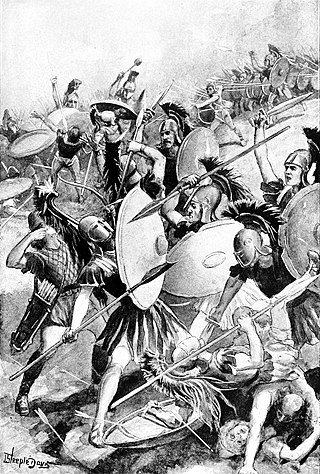
The Peloponnesian War was an ancient Greek war fought between Athens and Sparta and their respective allies for the hegemony of the Greek world. The war remained undecided for a long time, until the decisive intervention of the Persian Empire in support of Sparta. Led by Lysander, the Spartan fleet, built with Persian subsidies, finally defeated Athens and started a period of Spartan hegemony over Greece.

The 5th century BC started the first day of 500 BC and ended the last day of 401 BC.
This article concerns the period 429 BC – 420 BC.
This decade witnessed the continuing decline of the Achaemenid Empire, fierce warfare amongst the Greek city-states during the Peloponnesian War, the ongoing Warring States period in Zhou dynasty China, and the closing years of the Olmec civilization in modern-day Mexico.

This is a timeline of ancient Greece from its emergence around 800 BC to its subjection to the Roman Empire in 146 BC.
Year 405 BC was a year of the pre-Julian Roman calendar. At the time, it was known as the Year of the Tribunate of Barbatus, Capitolinus, Cincinnatus, Medullinus, Iullus and Mamercinus. The denomination 405 BC for this year has been used since the early medieval period, when the Anno Domini calendar era became the prevalent method in Europe for naming years.
Year 406 BC was a year of the pre-Julian Roman calendar. At the time, it was known as the Year of the Tribunate of Cossus, Ambustus, Cossus and Potitus. The denomination 406 BC for this year has been used since the early medieval period, when the Anno Domini calendar era became the prevalent method in Europe for naming years.
Year 413 BC was a year of the pre-Julian Roman calendar. At the time, it was known as the Year of the Consulship of Cossus and Medullinus. The denomination 413 BC for this year has been used since the early medieval period, when the Anno Domini calendar era became the prevalent method in Europe for naming years.
Year 415 BC was a year of the pre-Julian Roman calendar. At the time, it was known as the Year of the Tribunate of Cossus, Vibulanus, Volusus and Cincinnatus. The denomination 415 BC for this year has been used since the early medieval period, when the Anno Domini calendar era became the prevalent method in Europe for naming years.
Year 424 BC was a year of the pre-Julian Roman calendar. At the time, it was known as the Year of the Tribunate of Crassus, Fidenas, Rutilus and Iullus. The denomination 424 BC for this year has been used since the early medieval period when the Anno Domini calendar era became the prevalent method in Europe for naming years.
Year 426 BC was a year of the pre-Julian Roman calendar. At the time, it was known as the Year of the Tribunate of Cincinnatus, Albinus, Fusus and Cossus. The denomination 426 BC for this year has been used since the early medieval period, when the Anno Domini calendar era became the prevalent method in Europe for naming years.

The Peace of Nicias was a peace treaty signed between the Greek city-states of Athens and Sparta in March 421 BC that ended the first half of the Peloponnesian War.

Nicias was an Athenian politician and general during the period of the Peloponnesian War. Nicias was a member of the Athenian aristocracy and had inherited a large fortune from his father, which was invested in the silver mines around Attica's Mt. Laurium. Following the death of Pericles in 429 BC, he became the principal rival of Cleon and the democrats in the struggle for the political leadership of the Athenian state. He was a moderate in his political views and opposed the aggressive imperialism of the democrats. His principal aim was to conclude a peace with Sparta as soon as it could be obtained on terms favourable to Athens.

The Sicilian Expedition was an Athenian military expedition to Sicily, which took place from 415–413 BC during the Peloponnesian War between Athens on one side and Sparta, Syracuse and Corinth on the other. The expedition ended in a devastating defeat for the Athenian forces, severely impacting Athens.
Gylippus was a Spartan general (strategos) of the 5th century BC; he was the son of Cleandridas, who was the adviser of King Pleistoanax and had been expelled from Sparta for accepting Athenian bribes in 446 BC and fled to Thurii, a pan-Hellenic colony then being founded in the instep of Italy with Athenian help and participation. His mother may have been a helot, which meant he was not a true Spartiate but a mothax, a man of inferior status. Despite this, from an early childhood he was trained for war in the traditional Spartan fashion and on reaching maturity had been elected to a military mess, his dues contributed by a wealthier Spartiate patron. For an individual of marginal origins, war was an opportunity to gain honor and eminence.

Demosthenes, son of Alcisthenes, was an Athenian general during the Peloponnesian War.
Lamachus was an Athenian strategos or general in the Peloponnesian War. He commanded as early as 435 BCE, and was prominent by the mid 420s. Aristophanes caricatured him in The Acharnians and subsequently honoured his memory in The Frogs. He was one of the three generals placed in command of the Sicilian Expedition.

Hermocrates was an ancient Syracusan general from Magna Graecia during the Athenians' Sicilian Expedition in the midst of the Peloponnesian War. He is also remembered as a character in the Timaeus and Critias dialogues of Plato.
Laches was an Athenian aristocrat and general during the Peloponnesian War.
The period of the 5th century BC in classical Greece is generally considered as beginning in 500 BC and ending in 404 BC, though this is debated. This century is essentially studied from the Athenian viewpoint, since Athens has left more narratives, plays and other written works than the other Greek states. If one looks at Athens, our principal source, one might consider that this century begins in 510 BC, with the fall of the Athenian tyrant and Cleisthenes's reforms. If one looks at the whole Greek world, however, we might place its beginning at the Ionian Revolt in 500 BC, that provoked the first Persian invasion of 492 BC. The Persians were finally defeated in 490 BC. A second Persian attempt failed in 480–479 BC. The Delian League then formed, under Athenian hegemony and as Athens' instrument. Athens' excesses caused several revolts among the allied cities, which were all put down by force, but Athenian dynamism finally awoke Sparta and brought about the Peloponnesian War in 431 BC. After both sides were exhausted, a brief peace occurred, and then the war resumed to Sparta's advantage. Athens was definitively defeated in 404 BC, and some internal Athenian agitations ended the 5th century in Greece.







